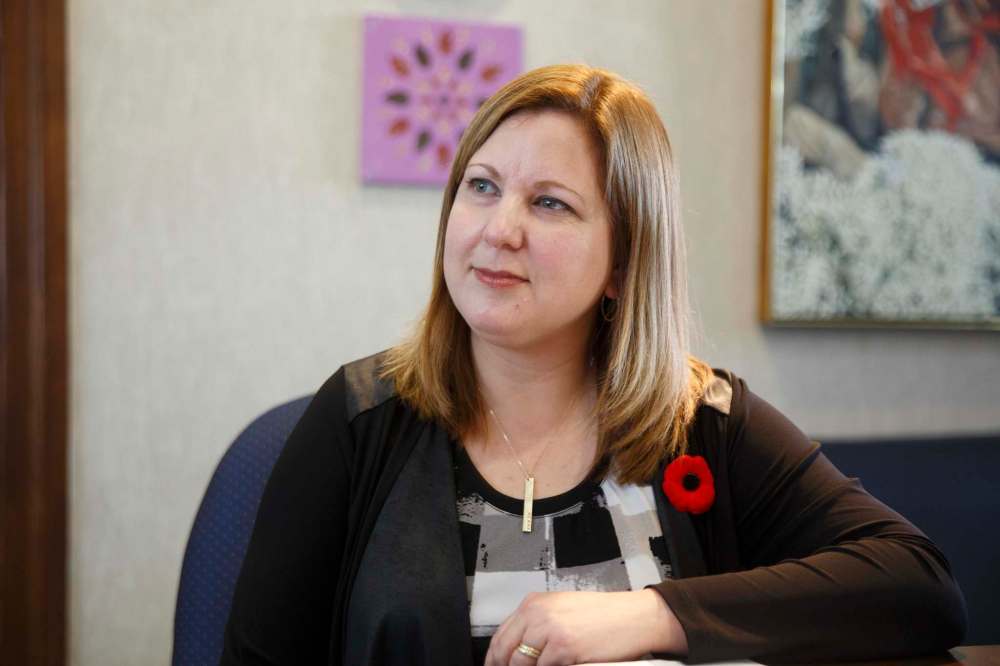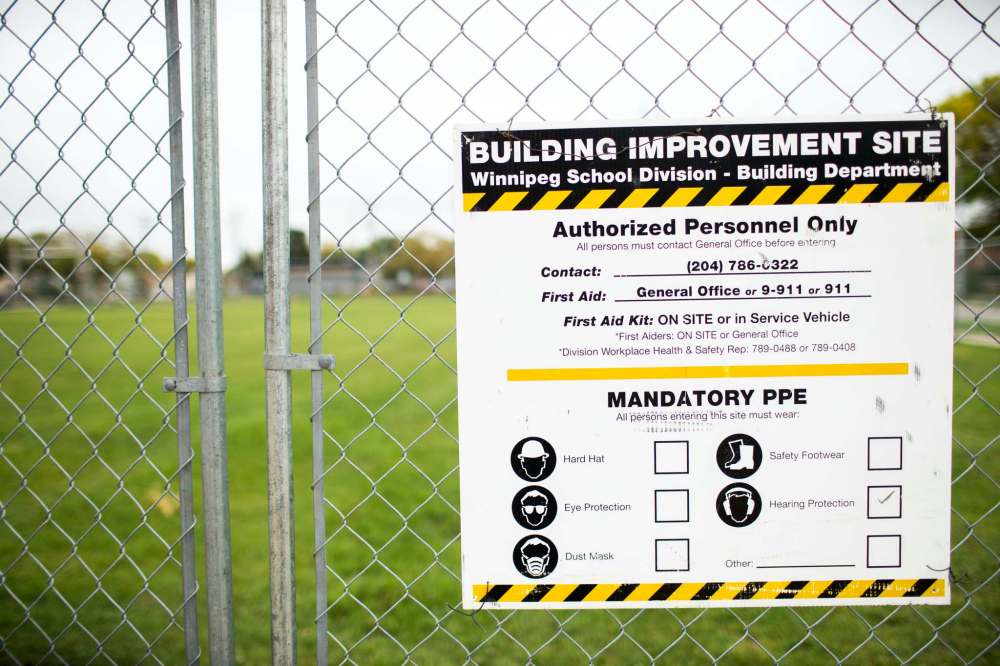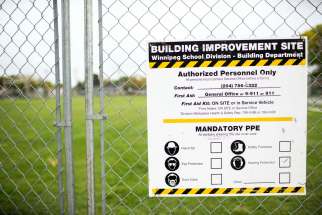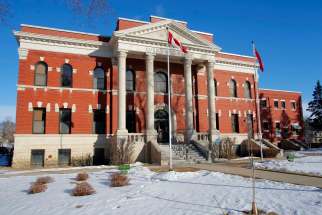Province plays down lead exposure fears stoked by independent report
Read this article for free:
or
Already have an account? Log in here »
To continue reading, please subscribe:
Monthly Digital Subscription
$0 for the first 4 weeks*
- Enjoy unlimited reading on winnipegfreepress.com
- Read the E-Edition, our digital replica newspaper
- Access News Break, our award-winning app
- Play interactive puzzles
*No charge for 4 weeks then price increases to the regular rate of $19.00 plus GST every four weeks. Offer available to new and qualified returning subscribers only. Cancel any time.
Monthly Digital Subscription
$4.75/week*
- Enjoy unlimited reading on winnipegfreepress.com
- Read the E-Edition, our digital replica newspaper
- Access News Break, our award-winning app
- Play interactive puzzles
*Billed as $19 plus GST every four weeks. Cancel any time.
To continue reading, please subscribe:
Add Free Press access to your Brandon Sun subscription for only an additional
$1 for the first 4 weeks*
*Your next subscription payment will increase by $1.00 and you will be charged $16.99 plus GST for four weeks. After four weeks, your payment will increase to $23.99 plus GST every four weeks.
Read unlimited articles for free today:
or
Already have an account? Log in here »
Hey there, time traveller!
This article was published 29/01/2020 (2139 days ago), so information in it may no longer be current.
A new independent report on the health risks of lead in Winnipeg soils says there is enough evidence to show contamination in certain neighbourhoods represents “a potential concern.”
The 323-page report, by Intrinsik Corp., says there is a higher chance children living in the North Point Douglas and Weston neighbourhoods will have elevated levels of lead in their blood.
Key recommendations
Community outreach: The province, in collaboration with key stakeholders, should develop a lead awareness communications and outreach program. Initiatives could include establishing a website or social media platform that provides regular updates and shares information. Training and information should be given to parents and caregivers of young children, as well as daycares, community centres and pre-schools.
Community outreach: The province, in collaboration with key stakeholders, should develop a lead awareness communications and outreach program. Initiatives could include establishing a website or social media platform that provides regular updates and shares information. Training and information should be given to parents and caregivers of young children, as well as daycares, community centres and pre-schools.
Bio-monitoring and environmental sampling: The report recommends measuring actual lead exposures of persons in high-risk neighbourhoods, with a focus on children under age seven. This would include the taking of blood samples. Environmental samples, including soil from play areas, dust from floors where children play, tap water and household paint could be collected from participating households to better understand children’s exposure to lead.
Weston School and playgrounds: Promote hand-washing and hygiene at the school to reduce risk. Collect more surface soil and sod samples following the spring thaw. Ensure the generation of dust is minimized during landscaping, including restricting leaf-blowing in some areas. Replace sand and gravel in the playground area with a soil barrier and rubberized playground surface material. Cover exposed soil surfaces with mulch, sod or other groundcover. Possibly replace the grass sports field with artificial turf.
Blood lead reporting and monitoring: The province should consider implementing a reporting system that ensures any Manitoba children tested for lead levels by a family physician or any other health professional are tracked and receive necessary follow-up. The report says this will help public health officials identify clusters of children who are potentially at higher risk.
— Intrinsik Corp. report
“For these neighbourhoods, the combination of elevated soil concentrations and lower socio-economic status creates greater concern for health risks,” says the report, released Wednesday.
It recommends a bio-monitoring and environmental sampling study be completed in the neighbourhoods, focusing on children under the age of seven. It would include taking blood samples from some children to measure lead exposure.
“If any children with higher blood-lead levels are identified, the need for medical evaluation and treatment, and household-focused or community-focused strategies for reducing lead exposures can be developed,” the report says.
A provincial cabinet minister and Manitoba’s chief provincial public health officer said Wednesday they would study the recommendation, but made no immediate commitment to adopting it.
Instead, they indicated they would be implementing other recommendations, including improving public education on the dangers of lead and requiring blood-test results showing lead levels above established guidelines be reported to provincial authorities.

“We have committed to working with stakeholders at reviewing the remaining recommendations, because those are not quick fixes,” said Conservation and Climate Minister Sarah Guillemard.
She said the province would work with the Winnipeg School Division to address specific recommendations addressing the potential for lead exposure at Weston School (1410 Logan Ave.).
Guillemard and Dr. Brent Roussin, the province’s chief public health officer, said their take from the report was the risk to Winnipeggers from lead in soils is low.
Soil lead levels have declined significantly over the past several decades with the phasing out of lead in fuels and the departure of lead-producing industrial activity in the Manitoba capital, they said.
Roussin said there are no plans right now to collect further soil samples — even though the study said there are gaps in information on potential lead contamination in some parts of the city.
Neither is soil remediation — or replacement — anticipated to be carried out in any areas of concern, he said, as it has little impact on an individual’s exposure to lead.

Elevated soil lead levels do not necessarily translate to higher exposure levels, particularly if they take precautions, such as hand-washing after handling soils, provincial officials said.
Soils aren’t the only contributor to potentially high blood-lead levels. Water from lead pipes may also cause elevated counts, they said.
The Winnipeg School Division, parents and opposition politicians reacted quickly to the report, which the province has had since December.
The school division, which received the report at the same time as the media, sent a letter home Wednesday afternoon with students at Weston School, where the lead-contaminated playing field has been fenced off since September 2018.
The letter from the Medical Officer of Health for the Winnipeg Regional Health Authority provided parents with some basic information from the report, said WSD spokeswoman Radean Carter. The letter says “the health risk from lead in soil remains low.”
Weston’s playing field was closed in response to media reports testing done in 2007, which was not released publicly, had shown unacceptably high lead levels.
“We have been advised by the province that, based on the findings of the consultant, the fencing on Weston School field is no longer required,” said Carter. She said she couldn’t comment on other recommendations in the report until the division has completed a more thorough review.
April Roller said she’s happy officials are figuring out what to do for Weston School. “I do worry that it took so long for the findings to come to our attention,” the parent council member said after reading the report.
“There’s so many children and adults that have worked in the building and been exposed to this over the last 40 years.”
Roller said she understands the cost of cleaning the whole area is in the millions “but the safety of the children and the staff and the community is very important, as well.”

WSD trustee Jennifer Chen (Ward 6) has accused the province of dragging its heels on dealing with lead contamination at Weston School because the children who go there come from poor families. She wants to make sure the playing field will be safe to open for the start of the next school year.
“Now is the time for action,” she said Wednesday.
A more troubling concern is the long-term impact lead contamination can have on children’s physical health, she said. The report recommends “bio-monitoring,” but Chen said she hasn’t seen any commitment from the province.
“If not, why not?” she asked.
Parent council member April Roller said she understands the cost of cleaning the whole area is in the millions “but the safety of the children and the staff and the community is very important, as well.”
Manitoba Liberal Leader Dougald Lamont lambasted successive provincial governments for not addressing the problem.
“Ingesting lead can have a permanent effect on children that carries through their lifetime,” said Lamont. “These are issues that have been swept under the rug and ignored for 30 years under the PCs and the NDP.”
Families who live in former industrial areas including Weston, Point Douglas and St. Boniface, where lead contamination occurred, should be tested to find out how much exposure they’ve received, Lamont said.
“We have to make sure we test kids and test families to see if they’re being exposed or not. If you do that, then at least there’s a possibility you can go to a doctor, there are thing you can do.”
larry.kusch@freepress.mb.ca
carol.sanders@freepress.mb.ca
wfppdf:https://wfpquantum.s3.amazonaws.com/pdf/2020/87356_soil-report-assessment.pdf|Lead in soil assessment:wfppdf

Our newsroom depends on a growing audience of readers to power our journalism. If you are not a paid reader, please consider becoming a subscriber.
Our newsroom depends on its audience of readers to power our journalism. Thank you for your support.
History
Updated on Thursday, January 30, 2020 8:08 AM CST: Adds missing word









